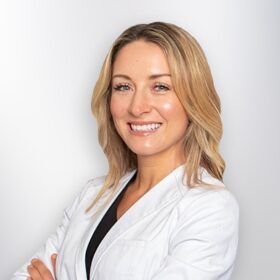Syncope, commonly known as fainting, is a sudden and temporary loss of consciousness. This occurs due to a reduced supply of oxygen-rich blood to the brain, often linked to low blood pressure (hypotension). The causes of syncope can be cardiac, metabolic, or neurological in nature.
Two of the most common forms of fainting include:
- Orthostatic Hypotension: A sudden drop in blood pressure when transitioning from lying to standing or sitting to standing.
- Vasovagal Syncope: A reflex response that leads to fainting due to overstimulation of the vagus nerve, which slows the heart rate and dilates blood vessels.
Abnormal blood pooling in the lower extremities can exacerbate both conditions. This is a common issue in patients with varicosas o insuficiencia venosa crónica.
How Varicose Veins and Venous Insufficiency Contribute to Syncope
Estas venas várices occur when the valves in the veins weaken, allowing blood to flow backward and accumulate in the legs. Over time, this leads to symptoms such as swelling, discomfort, and leg heaviness.
For individuals already prone to postural hypotension, the presence of venous insufficiency can worsen the condition by causing additional blood pooling. This further reduces blood circulation to the brain, increasing the likelihood of fainting episodes.
Managing Vasovagal Syncope and Orthostatic Hypotension
The most common treatments for managing syncope include:
- Increasing hydration to maintain adequate blood volume.
- Reevaluating chronic medications that may contribute to low blood pressure.
- Wearing medias de compresión. improves circulation and prevents blood from pooling in the legs.
Since venous insufficiency can complicate postural hypotension, specialists at Vein Treatment Clinic recommend an early evaluation for vein disease in patients experiencing recurrent fainting spells.
Advanced Treatments for Varicose Veins
If you suffer from varicose veins, several minimally invasive treatments can help restore proper circulation and reduce associated symptoms:
1. Radiofrequency Ablation (RFA)
- Uses heat energy to close problematic veins.
- Minimally invasive with a fast recovery time.
- Requires only local anesthesia, allowing for quick recovery and minimal downtime.
- Provides long-lasting results, reducing the risk of vein recurrence.
2. Endovenous Laser Therapy (EVLT)
- Similar to RFA but uses laser energy to seal veins.
- Effective for larger varicose veins.
- Performed under local anesthesia in an outpatient setting.
- Helps relieve pain, swelling, and discomfort associated with varicose veins.
3. VenaSeal
- A medical adhesive is used to seal the diseased vein permanently.
- No need for compression stockings post-procedure.
- Provides immediate relief with minimal side effects.
- Suitable for patients who prefer a non-thermal, non-tumescent treatment option.
4. Sclerotherapy
- Ideal for smaller varicose and spider veins.
- Involves injecting a sclerosing agent into the affected veins, causing them to close.
- Performed quickly with no need for anesthesia.
- Can be combined with other treatments for optimal results.
Expert Varicose Vein Treatment by Dr. Sareh Rajaee
Dr. Sareh Rajaee, a leading varicose vein specialist in New Jersey, contributed to this article. Dr. Rajaee specializes in varicose vein removal and spider vein treatments using state-of-the-art techniques like radiofrequency ablation (RFA), endovenous laser therapy (EVLT), and VenaSeal.
If you are looking for a Vein Treatment Clinic in New Jersey, contact us today to schedule a consultation with Dr. Sareh Rajaee and explore your treatment options.
Frequently asked questions
Can chronic venous insufficiency heal itself?
No, it doesn’t go away on its own. This condition means your leg veins aren’t working quite right, and over time, that can get worse. The good news is, we can treat it, safely and gently.
Can walking cure venous insufficiency?
Walking is great for your circulation, and it can definitely help your legs feel better. But it won’t fix the problem completely. Think of it like brushing your teeth: it’s part of the routine, but you still need the dentist when something’s wrong.
What are the best treatments for vein disorders?
We use simple, low-risk treatments that help close or shrink the veins that aren’t working well. These include:
- A small injection (sclerotherapy)
- A gentle heat treatment to close the vein (ablation)
- A special foam (Varithena) that targets larger veins
These are outpatient treatments, meaning you go home the same day.
Can chronic venous insufficiency affect your life expectancy?
Not directly, no. But if you ignore it, it can cause painful problems like swelling, wounds, or clots. That’s why it’s important to catch it early. With the right care, you can stay active and avoid complications.
Why is chronic venous insufficiency in the spotlight right now?
Chronic venous insufficiency has been getting more attention lately after reports about Trump’s vein condition. Some news sources shared that Donald Trump was diagnosed with CVI, a condition that can cause leg swelling and circulation problems. That coverage has helped raise awareness and made more people curious about their own symptoms. It’s a reminder that leg discomfort isn’t just part of getting older. It’s something worth checking out.
Final Thoughts
Syncope can be linked to insuficiencia venosa crónica and varicose veins, making early diagnosis and treatment crucial. If you experience fainting spells, leg swelling, or discomfort, consider an evaluation at Vein Treatment Clinic to prevent further complications and improve your quality of life.










